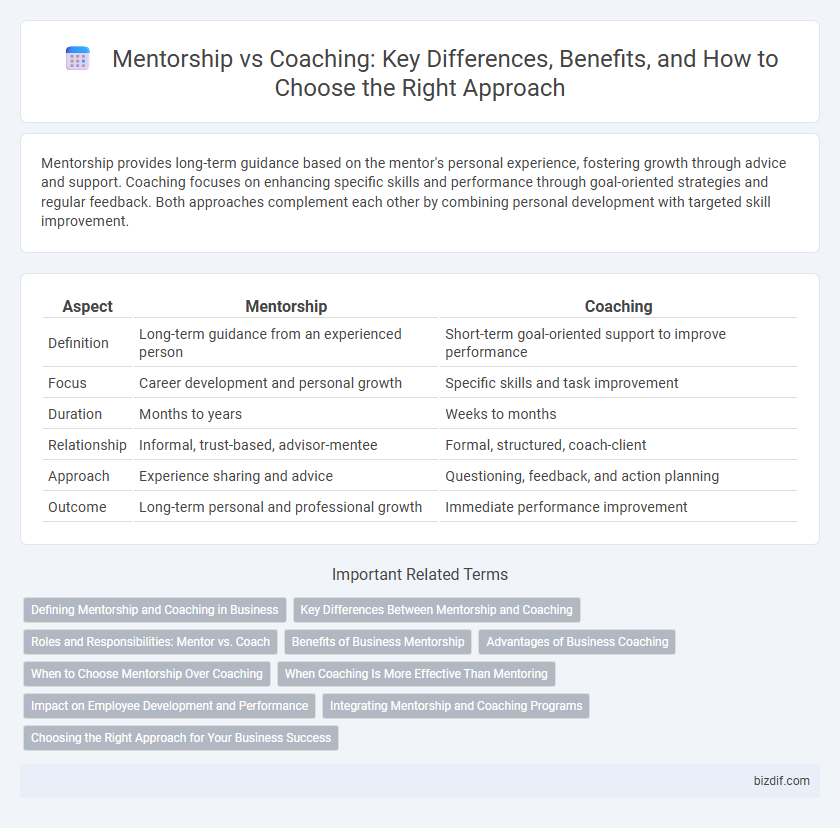Mentorship provides long-term guidance based on the mentor's personal experience, fostering growth through advice and support. Coaching focuses on enhancing specific skills and performance through goal-oriented strategies and regular feedback. Both approaches complement each other by combining personal development with targeted skill improvement.
Table of Comparison
| Aspect | Mentorship | Coaching |
|---|---|---|
| Definition | Long-term guidance from an experienced person | Short-term goal-oriented support to improve performance |
| Focus | Career development and personal growth | Specific skills and task improvement |
| Duration | Months to years | Weeks to months |
| Relationship | Informal, trust-based, advisor-mentee | Formal, structured, coach-client |
| Approach | Experience sharing and advice | Questioning, feedback, and action planning |
| Outcome | Long-term personal and professional growth | Immediate performance improvement |
Defining Mentorship and Coaching in Business
Mentorship in business involves a long-term relationship where an experienced professional provides guidance, knowledge sharing, and support to foster the mentee's career growth and personal development. Coaching focuses on specific skill enhancement, performance improvement, and goal achievement through structured sessions with a trained coach. Both mentorship and coaching play crucial roles in leadership development, employee engagement, and organizational success.
Key Differences Between Mentorship and Coaching
Mentorship involves a long-term relationship where an experienced mentor provides guidance, wisdom, and support for personal and professional growth, often focusing on career development. Coaching, by contrast, is typically short-term and goal-oriented, emphasizing skill-building, performance improvement, and accountability through structured sessions. Key differences include the mentor's role as a trusted advisor with a broader perspective, while the coach acts as a facilitator for specific outcomes and measurable progress.
Roles and Responsibilities: Mentor vs. Coach
Mentors provide guidance based on experience, offering long-term support and personal development to mentees by sharing wisdom and industry insights. Coaches focus on enhancing specific skills or performance through structured sessions, setting measurable goals and providing feedback for improvement. While mentors act as advisors and role models, coaches serve as facilitators who empower clients to unlock their potential.
Benefits of Business Mentorship
Business mentorship accelerates professional growth by providing personalized guidance rooted in real-world experience, enhancing decision-making skills and strategic thinking. Mentees gain access to a valuable network, opening opportunities for partnerships, funding, and market insights that are crucial for business success. This relationship fosters accountability and confidence, driving sustained performance improvements and long-term career advancement.
Advantages of Business Coaching
Business coaching enhances leadership skills and drives measurable performance improvements by providing tailored strategies and accountability. It fosters professional growth through continuous feedback, enabling executives to overcome challenges and optimize decision-making. Unlike mentorship, coaching focuses on achieving specific business goals with structured support and performance-driven outcomes.
When to Choose Mentorship Over Coaching
Choose mentorship over coaching when seeking long-term personal and professional growth guided by someone with extensive industry experience and wisdom. Mentorship provides ongoing support, career advice, and role modeling, making it ideal for navigating complex career paths or leadership development. Select mentorship when the goal is holistic development rather than addressing specific skills or performance issues typically targeted by coaching.
When Coaching Is More Effective Than Mentoring
Coaching is more effective than mentoring when specific skill development and performance improvement are the primary goals, as it offers structured guidance and measurable outcomes. It works best in short-term scenarios where focused feedback and goal-oriented strategies accelerate growth. Unlike mentoring, coaching directly addresses immediate challenges with actionable techniques tailored to individual needs.
Impact on Employee Development and Performance
Mentorship fosters long-term professional growth by offering personalized guidance, while coaching targets specific skills to enhance immediate job performance. Effective mentorship builds confidence and career direction, leading to sustained employee engagement and retention. Coaching improves productivity and goal achievement through structured feedback, resulting in measurable performance improvements.
Integrating Mentorship and Coaching Programs
Integrating mentorship and coaching programs enhances professional development by combining personalized guidance with targeted skills training, fostering holistic growth. Organizations that blend these approaches see increased employee engagement, improved leadership capabilities, and accelerated career progression. Leveraging data-driven insights to tailor mentorship-coaching frameworks maximizes effectiveness and aligns with organizational goals.
Choosing the Right Approach for Your Business Success
Mentorship offers long-term guidance rooted in personal experience, ideal for developing leadership skills and industry insights, while coaching provides targeted, goal-oriented support to improve specific performance areas. Selecting the right approach depends on your business objectives--choose mentorship for strategic growth and mindset development, and coaching for skill enhancement and immediate problem-solving. Combining both methods can maximize outcomes by fostering continuous learning and measurable progress.
Mentorship vs coaching Infographic

 bizdif.com
bizdif.com